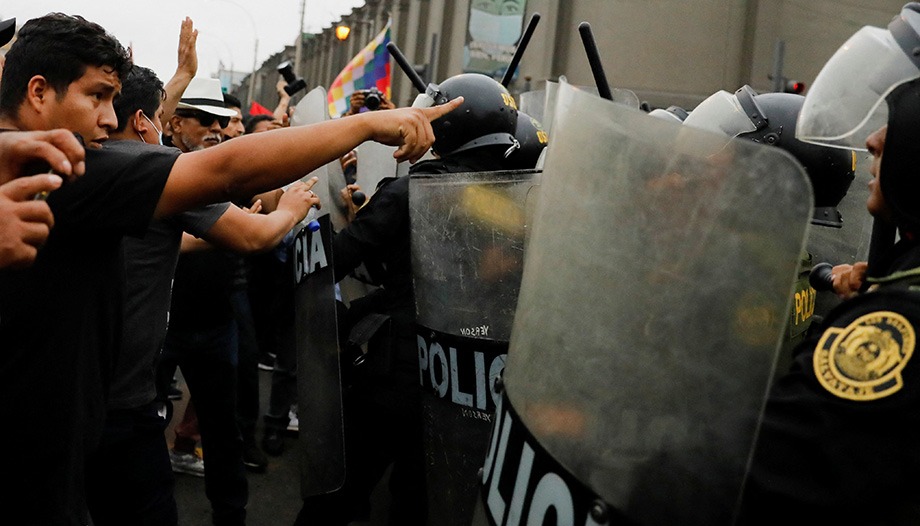Sunday, December 18 has been the day chosen by the Episcopal Conference of Peru to "express peace, hope and fraternity in Peru, through the Day of Prayer for Peace". This initiative, which each bishop will carry out in his ecclesiastical jurisdiction, has been promoted by the Peruvian bishops "in view of the serious situation of pain and violence that our Peruvian people are suffering due to the current political crisis".
To participate in this day, families are encouraged to place a symbol of peace in their homes and institutions (white flag or white handkerchief), from this moment on.
Call for serenity
The message of the bishops of Peru, after several days of clashes between police officers and demonstrators protesting against the Congress of the Republic and in favor of an early election, was read by the president of the Peruvian Episcopal Conference (CEP), Monsignor Miguel Cabrejos Vidarte, OFM, Archbishop of Trujillo, who is also president of the Latin American Episcopal Council (CELAM).
First, the note deeply regrets "the death of two people in Andahuaylas, Apurimac". Then, it makes "an urgent appeal to build bridges of dialogue, calling for serenity to all our compatriots who carry out protests in different parts of the country, whose claims, when just, must be heard; but that they exercise their right without violence".
The note is also addressed "to the Forces of Law and Order, especially the Peruvian National Police, to act within the framework of the Law, ensuring the integrity of the people".
The bishops appeal "to the political class, especially to the Executive Power and the Congressmen of the Republic, to be concerned about institutionality, democratic order, due process and the common good of all Peruvians, especially the most vulnerable", and also "to all the Institutions of Peru, to ensure the stability of the country, because we cannot afford the luxury of a misgovernment in our Homeland".
"Our beloved country," they continue, "must not continue in anxiety, fear and uncertainty. We need sincere dialogue, calm tempers in order to protect our weak Democracy, preserve the institutionality and maintain the fraternity of our people. Violence is not the solution to the crisis nor to the differences, no more violence, no more deaths, Peru must be our priority", they emphasize.
Finally, the Peruvian Catholic hierarchy invokes the Blessed Virgin of Guadalupe to "guide us along the paths of justice and peace".
State of Emergency
As is known, the new Peruvian government, presided over by lawyer Dina Boluarte, was sworn in last week before the full Congress as the first female president in the history of Peru, following the dismissal of the previous president, Pedro Castillo, who hours before had decided to dissolve the Parliament to avoid his alleged prosecution for alleged acts of corruption.
During the inauguration ceremony, Dina Boluarte called for dialogue to install a government of national unity, which has already taken office, and requested the Attorney General's Office to investigate the alleged acts of corruption that have affected Peruvian politics in recent years.
Subsequently, Peru's new government declared a 30-day national emergency amid violent protests following the ouster of Pedro Castillo, suspending public rights and freedoms in the Andean country.
Precisely on the first day of the State of Emergency ordered by the Government of Dina Boluarte, the highest number of deaths has been recorded.
Marches, deaths and injuries
The marches began last Wednesday, December 7. According to the Ombudsman's Office, 12 people died in the demonstrations, and six were victims of traffic accidents and events linked to the road blockades. So far, Ayacucho is the region with the highest number of deaths, seven. It is followed by Apurimac (6), La Libertad (3), Arequipa (1) and Huancavelica (1).
The Ombudsman's Office has reported that so far 210 civilians have been injured and 216 members of the Peruvian National Police have been injured, or 426. The blockades, marches and strikes have taken place in the departments of Ancash, Ayacucho, Cajamarca, Cusco, Moquegua, Puno and San Martin.
The same ombudsman institution has also requested in a press release dated in Lima the "immediate cessation of acts of violence in social protests and has asked the Armed and Police Forces to act in accordance with the Constitution and the Law".
"Defense of democracy".
A little more than a week ago, the Permanent Council of the Peruvian Episcopal Conference issued an press release in which he described as "unconstitutional and illegal the decision of Mr. Pedro Castillo Terrones to dissolve the Congress of the Republic and establish an exceptional emergency government".
Likewise, he stated that he "energetically and absolutely rejects the rupture of the constitutional order. It is the right and moral duty of peoples and citizens to defend democracy".
In the same communiqué, the bishops called for "national unity, to maintain tranquility, and to put a stop to any form of violence and affectation of the fundamental rights of citizens".









